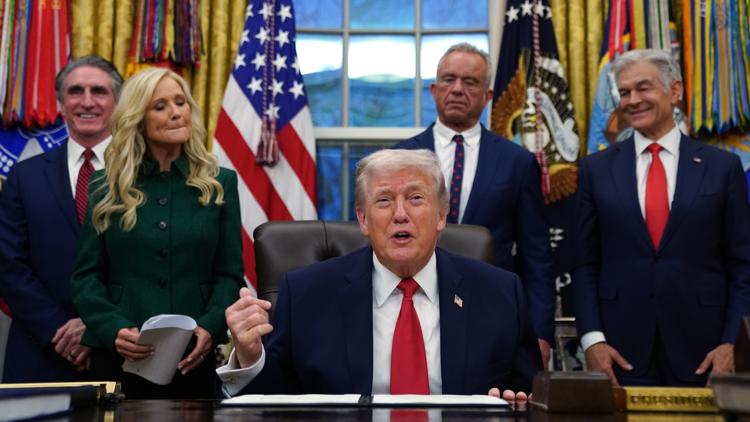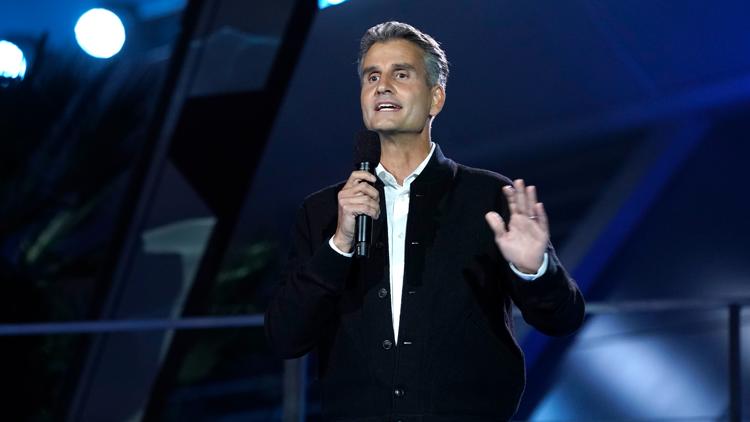Democrats dig in against GOP budget strategy, heightening odds of shutdown
Democrats are ramping up the pressure on GOP leaders over federal funding, drawing firmer red lines against the Republicans’ budget plans and elevating the chances of a government shutdown at the end of the month. House Minority Leader Hakeem Jeffries (D-N.Y.) on Wednesday warned that House Democrats are likely to reject a Republican funding package...

Democrats are ramping up the pressure on GOP leaders over federal funding, drawing firmer red lines against the Republicans’ budget plans and elevating the chances of a government shutdown at the end of the month.
House Minority Leader Hakeem Jeffries (D-N.Y.) on Wednesday warned that House Democrats are likely to reject a Republican funding package that keeps spending largely at current levels, as Speaker Mike Johnson (R-La.) is forecasting.
And across the Capitol, Senate Minority Leader Charles Schumer (D-N.Y.) voiced a similar warning, saying none of the plans being floated by Majority Leader John Thune (R-S.D.) would have the Democratic support to pass through the upper chamber.
“What the Republicans have proposed is not good enough to meet the needs of the American people,” Schumer said, “and not good enough to get our votes.”
The one-two punch aims to put Republicans on notice that Democrats aren’t ready to swallow a funding bill that cuts benefits for low- and working-class people, particularly those programs related to health care.
It also sends a political message to the Democrats’ liberal base — which was furious after Schumer helped usher an earlier GOP spending bill into law — that party leaders are united on the budget, at least for a moment, and itching for a fight.
Both Democratic leaders are hoping their threats of opposition will force Republicans to the negotiating table in an effort to forge a compromise that can clear both chambers with broad support from both parties — a bipartisan process, once routine, that’s faded as Washington has become more polarized.
“Democrats are prepared to support a bipartisan spending agreement that meets the needs of the American people, in terms of their health, public safety and economic well-being,” Jeffries told reporters in the Capitol. “But we will not support a partisan Republican spending bill that continues to rip away health care from the American people.”
From the House minority, Jeffries and the Democrats have no power to block the funding legislation if Johnson is able to rally GOP lawmakers behind it. The longer-term question is whether Democrats would also hold the line in the Senate, where they have the power to sink the bill in the form of a filibuster — if they choose to use it.
In March, Schumer infuriated House Democrats when he voted for the Republican-only bill, sending it to the desk of President Trump. This time around the Senate Democratic leader appears to be taking a different tack, at least rhetorically, warning Republicans that a partisan bill is the surest way to a shutdown.
“Leader Thune needs to sit down with us and negotiate a bipartisan bill that meets these needs in order to get something to pass,” he said.
Behind Speaker Johnson, Republicans are racing to fund the government before it expires at the end of the month. A failure of Congress to act would result in a partial government shutdown.
On Tuesday, the Speaker said his preferred strategy is to move a stopgap funding bill, known as a continuing resolution (CR), to extend federal funding largely at current levels. He hopes to combine that CR with updated allocations for several of the agencies, including funding for veterans programs and military construction, the Agriculture Department and legislative branch.
House Republicans on Wednesday advanced that strategy by voting to set up a so-called conference committee charged with ironing out any policy differences between the House and Senate versions of the legislation.
Johnson said he’s ready to work with Democrats — if they’re ready “to spend less money than we did last year.”
“The ultimate question of whether there's going to be a government shutdown at the end of the month is going to be up to congressional Democrats, and that's just the way it is,” Johnson said.
Democrats have rejected that argument out of hand, emphasizing that Republicans control all levers of power in Washington. And Jeffries and Schumer appear ready to gamble on who gets the blame, racing to shut down the GOP’s spending designs with warnings that a simple extension of current spending levels would be insufficient to win the Democrats’ support.
Jeffries noted that House Democrats were virtually united against a Republican-only spending bill in March, when they warned it would undermine federal programs at the expense of low-income people. With that in mind, he suggested it was an easy call for Democrats to oppose those same levels of spending in a CR, if Republicans choose to go that route.
“A continuing resolution that continues the failed policies of the Republican Party that we voted against [in March] is not the type of policy that actually meets the needs of the American people,” Jeffries said.
A major part of the health care debate revolves around ObamaCare tax credits that are scheduled to expire at the end of the year. Those subsidies currently benefit more than 22 million patients, whose premiums are expected to skyrocket if Congress doesn’t extend the credits.
Many Democrats think that issue must be addressed this month, since premium rate notices from insurance companies will begin to go out in October. That information is likely to influence the decision of patients to sign up for plans — or not — during ObamaCare’s open enrollment period, which launches before the tax credits expire.
Jeffries suggested that’s one of the red lines determining Democratic support for a spending bill this month.
“The open enrollment period begins in less than two months. It begins on Nov. 1,” he said. “So this is one of many issues that should be addressed urgently by the United States Congress.”
Alexander Bolton contributed reporting.
What's Your Reaction?



























































